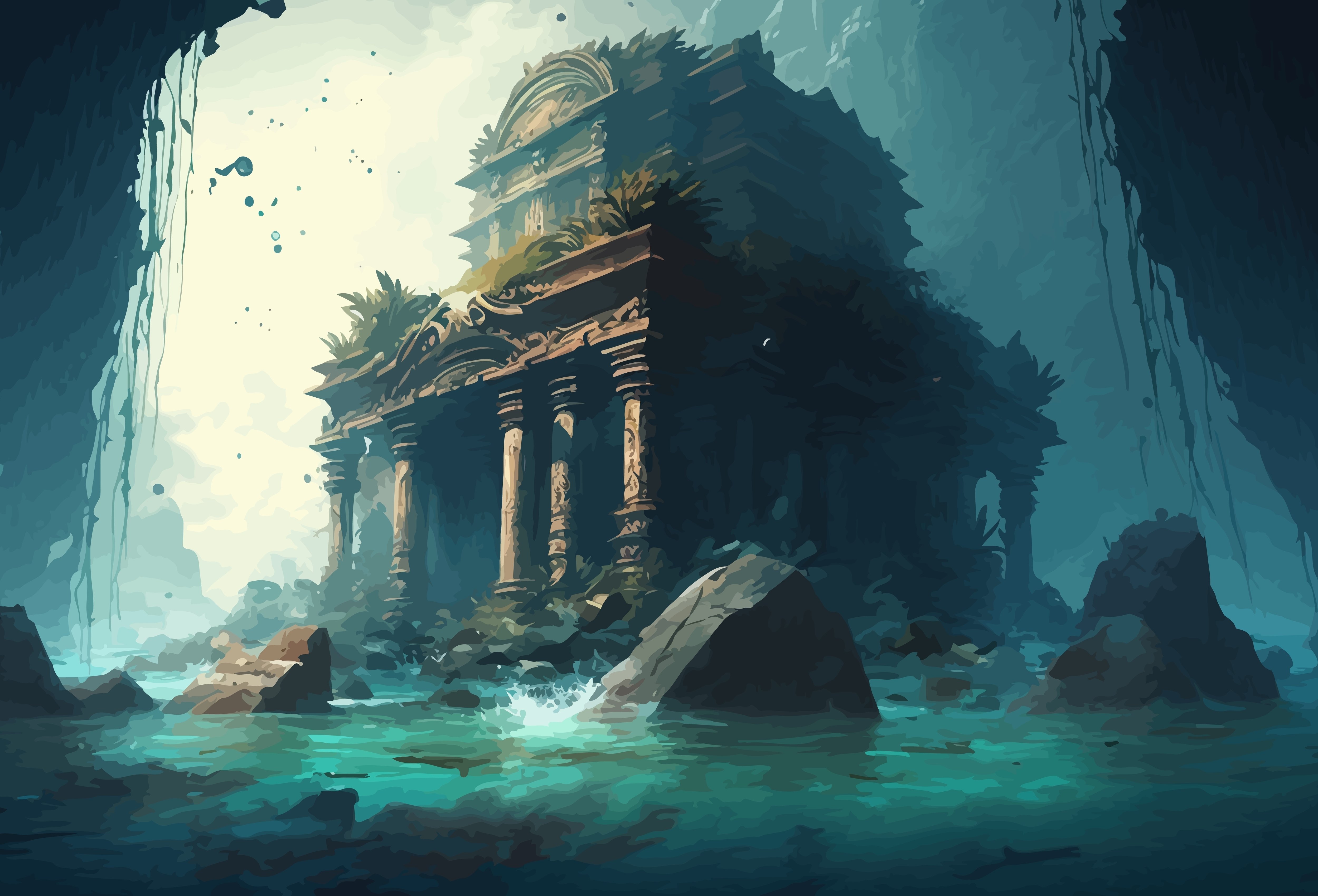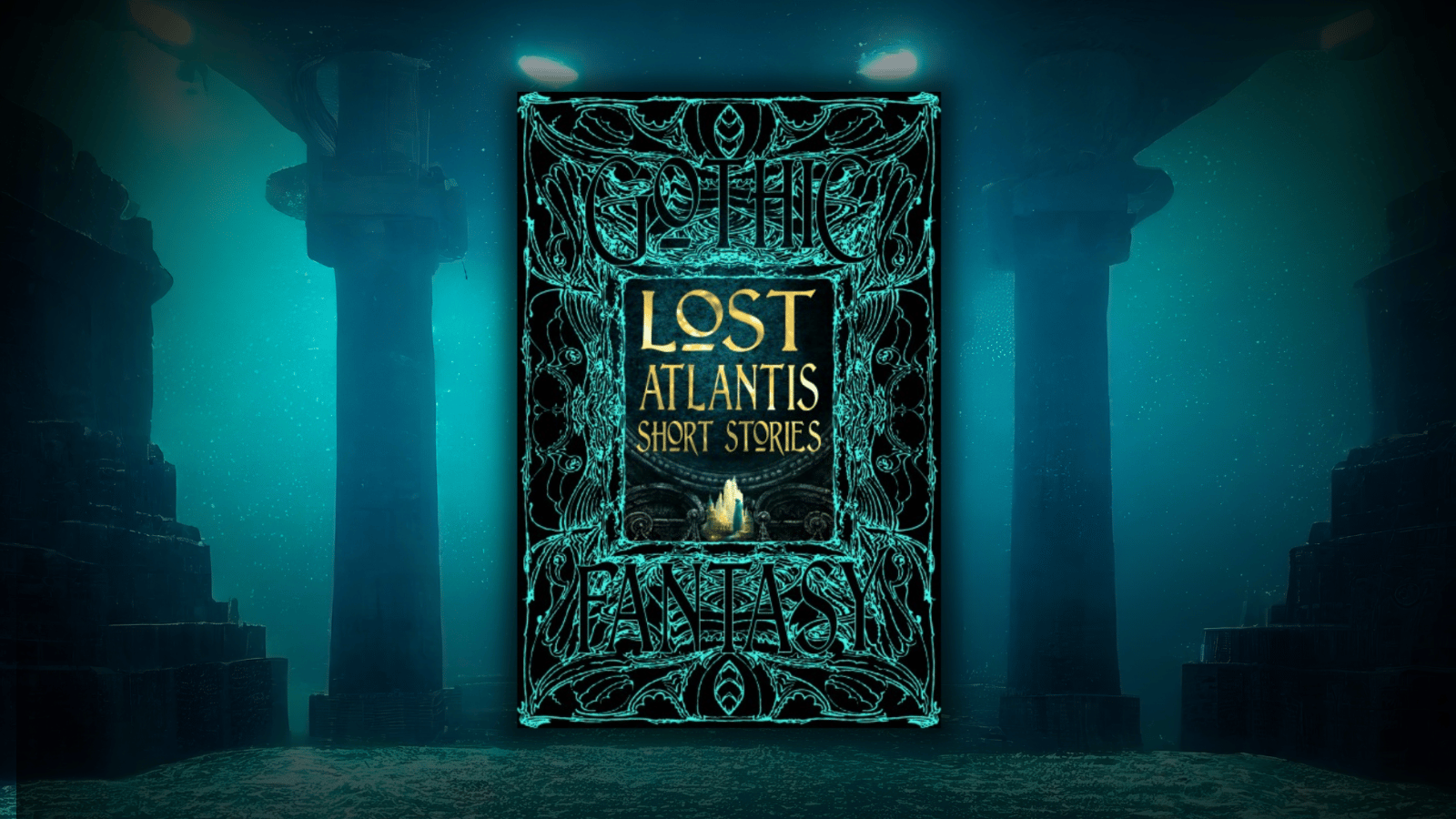Packed with intriguing tales, Lost Atlantis Short Stories is the latest to join our thriving series of Gothic Fantasy anthologies. In this book, once again, classic literature sits alongside brand new and recent stories by modern authors inspired by the theme. In last week’s Author Q&A, contributors spoke a little about their stories in the book. This week, they’re back to tell us about their writing methods, with recommendations of other imaginative works dealing with mythical continents, lost worlds, tantalising dreamlands and more…

What are your favourite stories from this genre?
John Moralee
When I was growing up, I watched Warlords of Atlantis starring Doug McClure and Peter Gilmore. The spirit of adventure and sheer fun of it left me curious to know if there really could be a hidden land somewhere. The director of that film (Kevin Connor) also made The Land That Time Forgot and At the Earth’s Core, written by Edgar Rice Burroughs. I loved them all.
Kwame M.A. McPherson
Definitely the recent Black Panther movies and the earlier Shaka Zulu television series. As for books, I enjoy Wilbur Smith’s ability to capture this type of setting in his novels, as well as Clive Cussler and his Dirk Pitt lead-character.
Isobel Granby
Retellings of the Ys story always interest me! The Celtic Myths and Legends podcast does a fun one. There, the teller is particularly sympathetic to the characters, even as they fail to avert disaster. I enjoy looking for patterns between stories like this, where even if there is not a developed narrative, certain recurring themes return each time, making for tantalising snippets of stories that might be.
Silas Leavitt
I love fantasy/science fiction at the edge of magic and reality – novels, like The Rise and Fall of D.O.D.O by Neal Stephenson and Nicole Galland, or the Dies the Fire series by S.M. Stirling, which explore the idea that the way we observe and experience the world also solidifies it. To me that seems such a beautiful and dangerous vein of possibility to be able to say, ‘If we change our thinking, we can change the world.’ Nothing stays the same forever.
Calie Voorhis
One of my all-time favourite books is Twenty Thousand Leagues Under the Sea – and one of my favourite parts is Atlantis. It thrills me to no end to have this preceding my story in Lost Atlantis. (OMG – I’m between Verne and Wells, my dreams have come true!) [see here for the full list of authors in Lost Atlantis].
David Hankins
The story that most heavily influenced my understanding of portal fantasy/SF was the movie Stargate. I loved the concept of being able to step into an ancient world only to discover that it was ruled by technology far beyond our understanding (plus, the plotting, characterisation, and acting in the original Stargate were fantastic!).
M.K. Hutchins
I have to name a historic example – Frederick Catherwood was an explorer and artist whose drawings of Maya stelae were so painstakingly accurate, they are still useful to epigraphers today. His experiences in different parts of the world led him to assert that the ruins in the Yucatan must have been built by the ancestors of the local Maya, contrary to theories popular in the Western world at the time.
Tracy Fahey
As a child, I was enraptured by ‘lost world’ narratives such as Twenty Thousand Leagues Under The Sea (Jules Verne) and Gulliver’s Travels (Jonathan Swift), as well as traditional Irish tales such as the story of Tír-na-nÓg (The Land of the Ever Young) where fairy princess Niamh takes hero Oisin to the land of the Sidhe, where he fails to notice that time is passing differently there… I continue to love the surreal world of the fairytale that transgresses into real life, as in the film adaptation of Angela Carter’s story in The Bloody Chamber – Neil Jordan’s 1984 The Company of Wolves. I also have a special fondness for the movie The City of Lost Children (1995, dir. Marc Caro, Jean-Pierre Jeunet) for its evocation of the mysterious steampunk world accessed by dreamers.
Rose Beardmore
Oh wow… I have a lot of favourites. The Ones Who Walk Away from Omelas is a personal favourite (and everyone’s favourite, if we’re being honest). It’s a classic! And Ursula K. LeGuin is the queen of speculative fiction. And if you’ve ever seen Doctor Who… nobody does lost civilisations quite like them.
Can you tell us a little about your writing process?
Deborah L. Davitt
Sure! I settle in with a good supply of tea or chocolate to fuel me, and generally write to what I call ‘signpost scenes’. I generally have a loose outline of where I want to go, but I don’t mind detours along the way. I let the characters, usually, tell me where they want to go, and we get where we’re going in good time. The shorter the story, the more likely I am to have a specific ending in mind – that’s the signpost I’m writing towards.
Barry Neenan
For me, it all hinges on characters. No matter how strong the concept is, it’s no good without a memorable cast. Dialogue helps the story move more naturally, I find. Contrasting a loud character against a quiet one is a natural dynamic which I often end up using, and one that’s clearly at play with Jackie and Molly in my story ‘Scavengers’ [in Lost Atlantis]. I enjoy the naming process, too – Jackie Calloway/’The Jackal’ was pretty fun, for instance!
Ash Arya
Whether working on long form or short stories, I write down the major plot beats by hand. Old-school pen and paper tend to work best for me for putting together first drafts as well. No ‘dreading the blank screen’ or battling the many distractions that come with technology. Though, credit where it’s due, brainstorming longer stories does become easier with the help of an Excel spreadsheet.
Leah Cypess
Once I get my kids out the door, I sit down (ideally with hot cocoa) and try to get a solid hour of writing in – almost always with notebook and pen. Sometimes the inspiration flows and I can just stay home and keep writing. But usually, after that first hour, I need to change my location – parks, coffee shops, libraries, etc. – and write in spurts over the rest of the school day.
Damien Mckeating
I have a small desk at home where I work. I usually sketch out a story in a notepad first; I like thinking physically on the page. This might be snatches of phrases, a description, a word. Sometimes a story feels fully formed and I’ll jot down the plot points. After that I start writing and see what happens, using the sketch as a rough map. I usually have to have an idea of the end point, otherwise I get lost along the way.
Erica Ruppert
I don’t outline at all. I usually begin with images and short scenes, and more often than not have the ending down before anything else. Once I have several scenes fleshed out and a sense of who the characters are, I begin refining and connecting them – and that’s where the characters take charge of the plot.
John Linwood Grant
I have no process. Sometimes I write direct to screen at a rapid pace; other times I make disjointed paper notes on scenes from parts of a tale. I don’t use anything technical except a basic word processor. I can write a novella in seven days, and then take a year to complete a short story, although paying contracts and set deadlines are usually inspirational. I tend to edit as I go, and then give it one last grand run-through.
C.R. Serajeddini
For short stories like my story in Lost Atlantis, I write without overthinking it. Usually, with good background music that suits the mood or setting of the story I’m working on. The first draft is almost never ‘ready’ – feedback from writer friends is essential! When planning novels, I write out a synopsis as though I’m a child telling you what happened in a movie: ‘…and then they fell out of the tower and landed in the snow…’ etc!
Zach Shephard
I don’t really consider myself a writer, so much as ‘a guy who occasionally writes’. As such, I don’t have a habitual process. These days, most of my writing happens because something in my life calls for it. More often than not, that means I’m sad (don’t worry – it’s just my default setting!) and need to unload my emotions into a story. ‘The Tower Calls’ [in Lost Atlantis] was a rare exception, in that it was written from a place of happiness – and I couldn’t be more pleased with the results.

The book is available to buy now – get your copy here!
Links
- Did you miss the first part of this Q&A? Catch up with Part 1, where authors discuss the inspirations behind their stories.
- See the full list of authors in this book.
- Browse the full collection of Flame Tree anthologies.
.png?width=3041&height=620&name=Beautiful%20books%2c%20Timeless%20storytelling%20(4).png)


